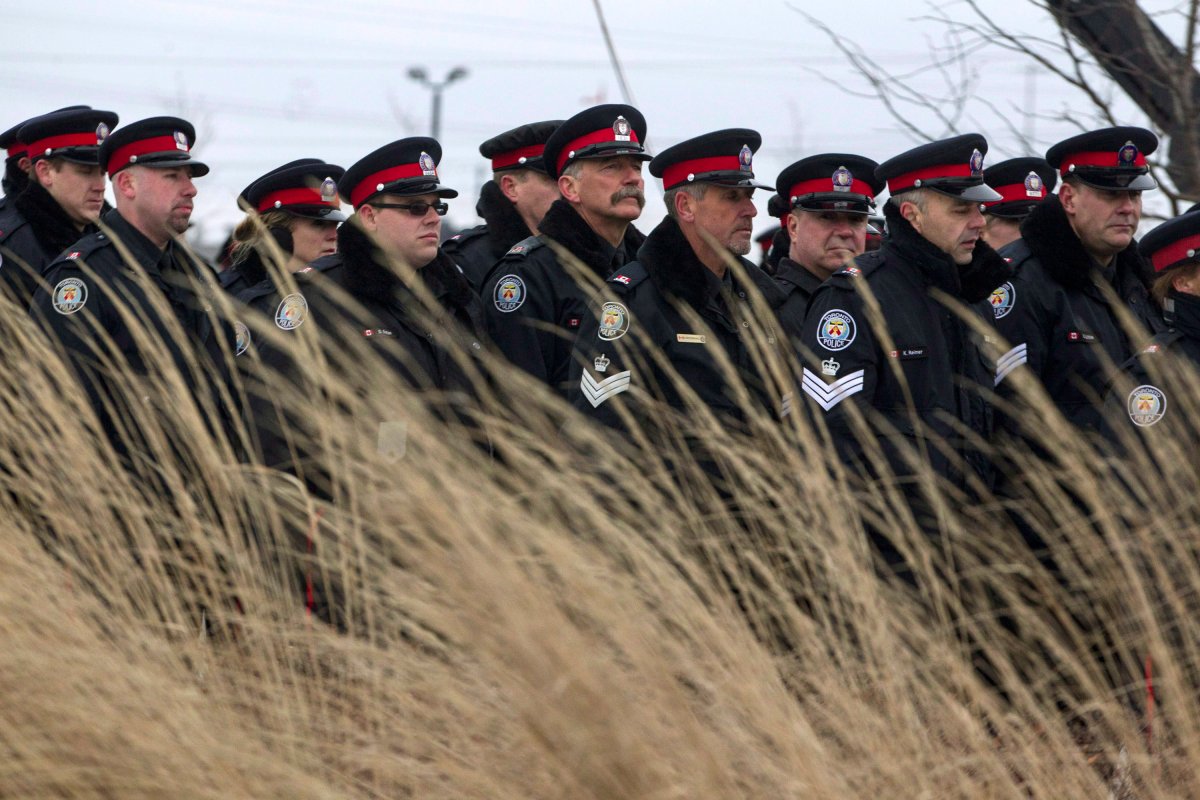As police chiefs across the GTA put the finishing touches on their plans for the next year, the question of recruitment after a turbulent few years continues to bubble under the surface.

In April, the Ford government announced a slew of changes to boost police recruitment, with the premier saying local forces were struggling to attract new cadets.
The province scrapped post-secondary degree requirements for new police recruits, expanded basic training programs and offered to pay the cost of tuition.
“We need reinforcements, we need more police officers on our streets,” Ontario Premier Doug Ford said at the time.
Toronto police chief Myron Demkiw agreed his force needed “support recruiting and training,” and the Toronto Police Association said that “everywhere, services are struggling to hire police officers.”
The COVID-19 pandemic, popular police defunding movements and a series of officers killed in the line of duty have contributed to recruitment issues, the Toronto police union said.
But, as plans for the next wave of police recruits solidify, just how much are Toronto-area police forces struggling to attract new officers?
A decline in applications
The overall number of applications to become a police officer in or around Toronto over the past five years appears to have dropped slightly, although thousands still apply every year.
Global News approached Toronto, Peel, York and Durham police to understand their recruitment challenges.
Peel police shared detailed recruitment data, while Toronto police also disclosed some statistics. York offered an interview on the topic and Durham Regional Police failed to respond over several months.
Const. Kevin Nebrija, a uniform recruiter with the York Regional Police’s recruiting unit, told Global News applications had dipped in the pandemic but were slowly on the rise.
He said recruitment figures reported so far in 2023 are showing signs of growth.
Data from Peel Regional Police shows that 2020 was a five-year high for applications to become an officer.
The number of applications to become an officer with Peel police averaged around 2,500 per year between 2018 and 2022. Both 2019 and 2022, however, were lean years with applications dropping below 2,000.
A spokesperson for Toronto police explained the force hires just a “small fraction” of the candidates who apply, meaning a lower number of applications doesn’t necessarily lead to fewer officers being hired.
- Infant, grandparents killed in Highway 401 crash after police pursuit from LCBO robbery
- Canada’s most wanted fugitive arrested in P.E.I. over Toronto homicide
- Parents of slain Halifax teen grapple with grief, anger: ‘No one listened’
- Trump faces jail threat as judge fines him for breaking gag order during trial
In 2022, for example, the Toronto Police Service received 3,370 applications and hired just 335 officers.
“We only take the most competitive and qualified candidates,” the Toronto police spokesperson said.
The high number of applicants for each position shows police aren’t struggling in a major way, one academic suggests.
“The claim that there is sort of full-scale recruitment issues within policing may not be entirely accurate,” Timothy Bryan, assistant professor in the Department of Sociology at the University of Toronto, told Global News.
He also pointed out that the raw number of candidates cannot tell the full story.
“The number of applicants isn’t necessarily an indicator of the quality of an applicant pool. That varies from pool to pool, from cycle to cycle, from year to year.”
Retirement driving need for more recruits
The number of recruits police need every year is dictated by two factors: how many new officers the chief has committed to adding and how many retiring police need to be replaced.
Those working in recruitment think a wave of senior officers reaching an age where they can access their pension is compounding recruitment.
“We are coming up on that time where a lot of the senior officers are reaching that 30, 35-year mark where they do decide to retire,” Const. Nebrija said.
“It’s a domino effect and you have to fill ranks below that.”
Toronto police said the effects of retirements are felt in rushes and need replacement in similar batches, leading to some years where a large number of retirements take place.
“As a result of hiring in large classes, officers tend to retire in waves,” the Toronto police spokesperson said.
“We lose an average of 250 officers per year to retirement, and these officers need to be replaced, in addition to growth requirements to address greater demand for policing services every year.”
Former Toronto police chief Mark Saunders told Greg Brady, host of Toronto Today on 640 Toronto, that retirement is “always a concern” but that it is just “a component” of the recruitment picture.
“My understanding is we’ve got 90 people year-to-date that have retired,” he said. “The recruiting is necessary. The TPS is short of people, and government is doing different incentives and law enforcement is doing different incentives.”
Difficult headwinds for future recruitment
Many in the Toronto-area policing community worry that the events of the past few years have made policing less appealing as a career and created a drain on recruits.
“COVID coupled with many factors happening in our society now has led to a decline in applications,” Const. Nebrija said, acknowledging that recruitment after the pandemic is “an issue everywhere, not just in policing in general.”
Union figures also argue that movements calling to defund the police in the wake of the 2020 death of George Floyd have made the situation worse.
In April, Toronto Police Association president Jon Reid pointed to “years of anti-police rhetoric” among a list of recruitment struggles.
Const. Nebjira said the danger of the job and the number of negative interactions with police officers plastered across social media can play on a candidate’s mind.
“The fact it is a dangerous job, and unfortunately, with the deaths of the eight officers over the past year, again, that will weigh on a lot of people’s minds,” he said.
“But we know there are people out there who, despite that, despite the risk… want to do the right thing.”
Several police officers were killed in Ontario, including Const. Andrew Hong of Toronto police, and Constables Devon Northrup and Morgan Russell of South Simcoe Police.
Saunders said that “policing is not a one-size-fits-all” job and changing entry requirements could help to get the right candidates into jobs with Toronto-area forces.
— with files from The Canadian Press


Comments